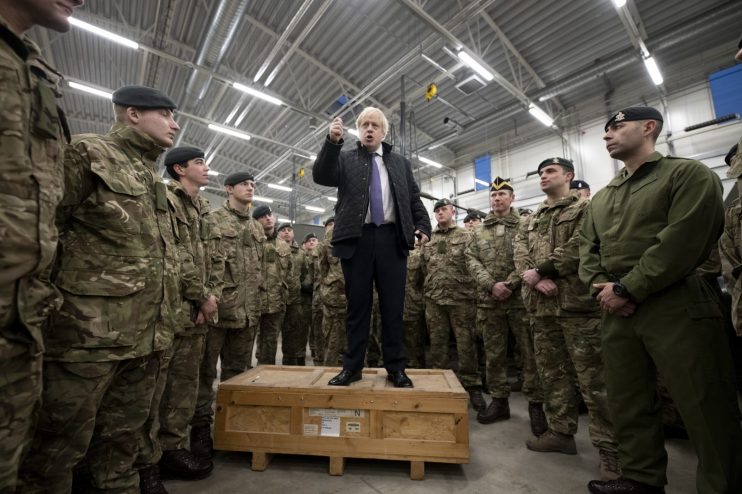Singing of arms and the man: Behind the big Boris defence announcement

The announcement was preceded, of course, by a leak to the media, so that it could make a splash in the morning press.
Standard practice these days, unfortunately — but the story was still an impressive one: the Prime Minister was giving the Ministry of Defence an extra £4bn a year for the next four years, because “the defence of the realm and the safety of the British people must come first”.
Fine, stirring words, and guaranteed to press the buttons of the traditional Tory right, men and women who have had to put a brave face on reductions in the armed forces’ budget for many years now. Options for Change, Front Line First, the Strategic Defence and Security Review — all have been packaged as “holistic” analyses of the UK’s capabilities, but all have been, in truth, predicated on a shrinking budget.
The Prime Minister has changed that narrative, and for that he deserves credit. He is quite right to identify defence of the realm as the first duty of the state, and correct too that the armed forces are, as they have been for decades, badly underfunded.
It is a commonplace in the world of defence wonks to note that we would not now be able to mount a rerun of Operation Corporate (the liberation of the Falkland Islands in 1982); in truth, we would struggle to replicate Iraq or Afghanistan. So this considerable increase in spending is welcome.
However, the real story is obscured by the flashy headline. £4bn a year is a lot of money, but the annual defence budget is north of £40bn, and big-ticket items are ruinously pricey. Each F-35B Lightning jet, for example, costs a little under £200m. This is dwarfed by Trident, of course: the last defence review calculated that the cost of the four new ballistic missile submarines would be £31bn. That gives us an idea of the quantum we are contemplating.
Let us look, too, at what the Prime Minister has highlighted as spending priorities. Type 32 frigates (built in the UK and therefore supporting the shipbuilding industry); directed-energy weapons; a new artificial intelligence centre; and an RAF Space Command, aiming to launch its first rocket (from Scotland) in 2022.
High-tech, high-visibility investment in cutting edge research and design, which will be important in meeting present and future threats, but little comfort to the 1,500 personnel still deployed in Iraq and Afghanistan, and of limited immediate relevance to the average infantryman.
The most eyebrow-raising aspect of this announcement is its timing. The government’s Integrated Review of Security, Defence, Development and Foreign Policy, intended to examine the UK’s needs and priorities across the board of international affairs, which began in October 2019, is still underway. Its publication date has been delayed by the Covid-19 pandemic and the wheels are moving slowly: rumours from inside the MoD suggest that the Army’s submission has yet to be accepted.
So on what basis have these spending decisions been made? They certainly can’t have been based on the thorough analysis of threats and capabilities we were promised — or, if they are, then the Integrated Review was a waste of time and many contributors will feel short-changed.
It was interesting to note that the chancellor, Rishi Sunak, tweeted about the new investment and his first two points were the creation of jobs and the revival of UK shipbuilding; important bonuses, certainly, but surely not the driving purpose of a defence review?
One should not be churlish. New spending for the MoD is welcome, and this is a lot of money. But it has not been planned according to strategic needs or threats, and it does little to address the defence budget’s procurement “black hole” (calculated by the National Audit Office at £13bn). It’s headline-grabbing, but fails to address some of the most basic needs of the armed forces, like armoured fighting vehicles and the long-term future of the Challenger 2 tank fleet. It might deserve, to paraphrase, EM Forster, two cheers. And it is a triumph for Ben Wallace, the defence secretary who now appears to be back firmly in Number 10’s good books.
But we have a long way to go before our military capabilities match the swooping rhetoric of the Prime Minister’s announcement.
Main image credit: Getty